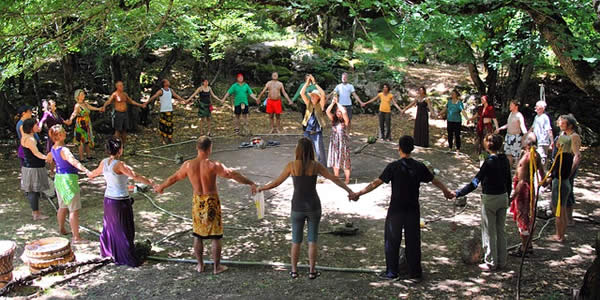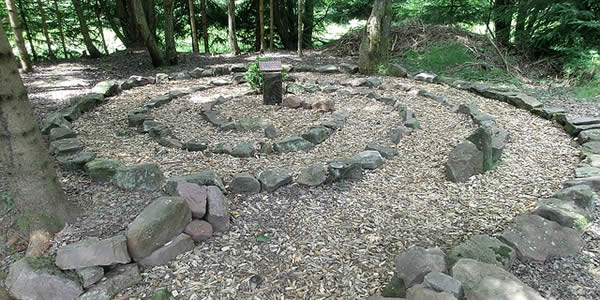[Author’s Note: This was originally written for non-Pagans. If you like it and would like to use it that way, feel free but–as always–be sure to keep my name attached.]
Is Wicca a cult?
Ask your minister, and he’ll probably say yes. Ask a Wiccan and she’ll certainly say no.
Neither one will be lying.
How can this be?

Until comparatively recently, few people used the word “cult” at all, with the exception of scholars who used it (and still do) in its original sense, from the Latin “cultus”: the body of practice or ritual surrounding a particular deity¹. Thus, the Romans had the religion of the Olympian Gods, within which was the cult of each individual God. The same is true of the Ancient Egyptians and Greeks, and of present-day polytheistic religions as well.
In a broader sense, the word “cult” is also true of any strongly-held belief which impels its adherents to perform rituals or ritualistic actions. So technically speaking, every religion is, or contains, a cult. If the order of service is the same most every time, if (for instance) a ritual meal or communion is shared and approximately the same words are used each time to bless it, this is a cult. And there is absolutely nothing negative about it.
But the word “cult” was redefined, over the relatively short period of about ten years, in one of the most striking examples ever of the power of the mass media². This new definition was dramatically etched on the national consciousness by two horrific “media events:” the Tate-La Bianca murders by Charlie Manson’s “family,” and the Jonestown massacre.
In their efforts to make sense of these senseless crimes, the news media — especially television — brought in many social scientists who, using the word “cult” in its scientific sense but in a non-scientific setting, inadvertently gave it an entirely new meaning. It now seems to mean, “A belief outside mainstream religion; one which is likely to bring harm to its practitioners or cause them to engage in anti-social acts. Fake religion.” This is the definition we are now more or less stuck with, though it is well to remember that the socio-scientific sense is still the more valid.
On the face of it, Charlie Manson and the Reverend Jim Jones would seem to have little in common besides a lack of concern for human life. After all, Jim Jones, however misguided he became, started out as a minister of the Gospel, and Charlie Manson at one time claimed to be the anti-Christ. Jim Jones recruited impoverished street people; Charlie Manson formed his group from disaffected yuppies. In actuality, they are more alike than not. Both are vivid examples of what is now recognizable as a typical cult leader³.

One of the most telling differences between a faith and a cult, as the word is now used, is that the religious experience in a cult is based on the power of the leader’s personality, or charisma. Devotion and obedience to this leader is invested with higher spiritual meaning and worth than understanding and following the tenets of the faith. Sometimes the leader claims to be speaking for or “channeling” God; one well-known cult leader, Reverend Moon, claims actually to be God.
A cult leader will claim access to knowledge unavailable to anyone else, often via direct revelation; Jim Jones, for instance, claimed that he had personal conversations with God which gave him the “correct” interpretations of obscure Biblical passages, under all of which God gave him absolute authority over his flock. Charlie Manson interpreted pop lyrics as coded messages from an imagined secret society or brotherhood of adepts; again, he used this “special knowledge” to direct and control his group. Often, this purported knowledge will be of some impending cataclysm or millennium which the members of the group can survive only by obedience to the leader. This increases the likelihood that the members will be obedient, while also increasing their sense of superiority over those ignorant of their “secret.”
But there’s another, even darker element to the current definition of a cult.
Since the radical ’60’s and 70’s with their equally radical religious movements, a reaction has set in. Fundamentalism, a belief that it is necessary to return to strict adherence to the fundamentals of religious belief and practice, has swept the country. A similar phenomenon has occurred in the Islamic world, with disastrous results. Fundamentalist Christians believe that the Bible is to be construed literally, and further that it is the only source of truth about any topic. It is often an article of faith with them that all other beliefs, even other Christian denominations – even many groups which are not about religion at all, like Scouting or the Democratic Party – are cults. And all cults, in their view, have one source: Satan. By this logic it is possible to be a Satanist without even knowing it; thus the only way to avoid inadvertent damnation is rigid obedience to Fundamentalist doctrine.
By a process which resembles blackmail more than it does theological discussion, all it now takes to discredit someone else’s religion is to call it a cult⁴. The odd thing is, the very people and groups using the word most freely about others partake more than most of the characteristics of a cult: rigidity, mind control, and xenophobia. It behooves us, then, to find out something about any group we encounter before taking anyone’s word for its cultishness.
What makes one group a cult and another not? The Bible does have the answer: “By their works shall ye know them.” You can tell a cult not by what it says about itself, which may be a lie, but by its effect on the lives of its followers.

Druid and Pagan scholar P.E.I. Bonewits made a considerable study of “the cult of the dangerous cults.” He identified certain characteristics which make up what we now call a cult, and a rating system on a scale of 1 to 10 on which to evaluate these characteristics.
This “Advanced Bonewits Cult Danger Evaluation Frame⁵,” ABCDEF for short, does not attempt to tell you what to believe. But it can tell you how involvement in a particular group might change your life. Under these guidelines, it can be seen that some groups which appear on the surface to be fine, upstanding organizations may be quite cultish. And other groups, even though their beliefs may put them far out of the mainstream, may not be. Wicca (bet you were wondering when I’d get back to that) is one such group.
Bonewits remarked that groups which score low on the danger scale also seem to score low for viability, primarily because no attempt is made to control the members or restrict their access to other groups. Wicca groups tend to have abysmally short life-spans, because individuals are encouraged to get acquainted with the many alternative groups in each geographic location, and because no higher authority exists than the individual conscience. There is no such thing as heresy, only a mis-match between individual and group. Naturally, too great a mismatch will lead to the individual leaving Wicca altogether, but Wiccans tend to put the good of the individual first: if someone is not happy in the Craft, we do not begrudge them happiness elsewhere.
Rather than restricting the individual’s access to outside information, the leaders of Wicca groups (not all of them, by the way, are called covens) tend to insist on a broad study of world religions, the sciences and arts. We do not want blind faith from our members; we want informed, intelligent thought. People who require what we see as spoon-fed faith are most often steered to more traditional religions.
Speaking of leaders, you will never find a Manson, a Jones, or a Moon at the head of the Wiccan movement. Many people seem to have trouble comprehending this, but there is no Wiccan leadership above the coven, grove, or study group level. There are people we respect as Elders for their wisdom and long years of service to the Craft, but they have authority over nothing but their own immediate group, if that. In Wicca, no one has a hot line to Deity. And since little or no money changes hands, and it, too stays at the local level, there is little incentive to seek power. Ours is a society of peers, without prophets or bishopric.
Wicca also has no universally-held dogma⁶. It is one of the few (maybe the only) religions in the world which cheerfully admits that it is not the product of revelation. It is the product, rather, of study, experience, and the often painful search for spiritual relevance in an increasingly irrelevant world. We have no one Book to be revered and obeyed; instead whole libraries are studied and critiqued and used as we see fit. This lack of either reverend leadership or absolute doctrine leads to a wide variety of beliefs and practices being recognized among us as equally valid expressions of Wicca.
It is probably accurate to generalize that Wiccans all believe in the Goddess, the Divine feminine creative spirit. Many but not all of us believe also in Her masculine counterpart and consort, the God. Most of us believe in psychic ability, though we do not all claim to have it, and quite a few of us practice the non-causative sciences, or magic. Reincarnation is a common but not universal belief about the afterlife, and even then we don’t all have the same definition of reincarnation. Beliefs about the Creation range from the Big Bang to the Spiral Dance. None the less, we usually know a fellow Wiccan when we meet one; there is a kindred spirit which is more valuable to us than agreement about doctrinal details.
Since Wiccans do not believe we possess any One Revealed Truth (or that anyone else does, either) we don’t assume that our religion is necessarily best for everyone. In fact, we know otherwise; Wicca has always attracted a specific, minority personality-type. And since we do not believe in vicarious redemption or in the need to “save souls,” Wicca teachers actively discourage sudden conversion as probably the result of an unstable personality. Wiccans do not gain cosmic Brownie-points by convincing large numbers of others to join up.
We tend to feel that the reason there are so many religions in the world is so that there will be enough different paths to the Infinite that everyone can find one which they can walk with joy. We do wish that others would let us walk our own path in peace instead of insisting that everyone must walk theirs; this attitude strikes us as both narrow and arrogant.
And Satan? A study of history will show that Satan – this personal Devil out to steal souls from God – was an invention of the Medieval Christian authorities, loosely based on elements of the Hebrew Shaitan, the Egyptian Set, and the Manichean anti-god Ormuzd. The concept of the war between God and Satan was brought into late-Roman Christianity from Persia by the far-traveled Bishop (later Saint) Augustine⁷. In a cynical move to discredit the old Pagan religions it was attempting to replace, the Church ascribed to Satan most of the physical features of the Pagan Gods, especially horns and phallicity. Yet the Bible does not describe Satan, and it specifically mentions horns as a sign of sanctity⁸, not diabolism. The exuberant fertility of the Old Gods was perverted into the empty lust of the incubus, and gleefully recorded as such in the torture records of the Inquisition. Such things have no place in the nature-oriented and life-affirming (not to mention freedom-loving!) beliefs of Wicca.
In recent years, in fact, we Wiccans have been most alarmed by the tendency of our Christian neighbors to devote far more time and energy to their Satan than to their God. They seem to see the Devil everywhere and in all the ordinary set-backs of their lives: can’t get ahead? The Devil is blocking me. Not feeling well? The Devil is oppressing me. Can’t keep my hands off other people’s money? The Devil made me do it. My second cousin got hit by a car? The Devil did it to test my faith. This dwelling on the principle of evil, we feel, cannot possibly be good either for the individuals or for society. This kind of “religion” puts fear in the place of faith, conspiracy theory in the place of theology, and Satan in the place of God. It is a corruption of the true meaning of the life, teachings and death of Jesus, and a cult of the most destructive kind.
The antidote to fear is knowledge, not repression; love, not condemnation. In one of the few bits of lore Wiccans have which purports to come straight from the Goddess, She says “My law is love unto all beings.” There is no place for Satan, no place for cults of control and domination, within that Law.
References
- http://dictionary.reference.com/browse/cult (back)
- http://www.urbandictionary.com/define.php?term=cult (back)
- http://www.anandainfo.com/cult_leaders.html (back)
- http://www.watchman.org/index-of-cults-and-religions (back)
- http://www.neopagan.net/ABCDEF.html (back)
- http://www.religioustolerance.org/wic_beli.htm (back)
- http://www.sparknotes.com/philosophy/augustine/themes.html (back)
- http://biblehub.com/topical/h/horn.htm (back)

Patheos Pagan on Facebook.

the Agora on Facebook
The Rantin’ Raven is published on alternate Saturdays here on the Agora. Subscribe via RSS or e-mail!
Please use the links to the right to keep on top of activities here on the Agora as well as across the entire Patheos Pagan channel.

















